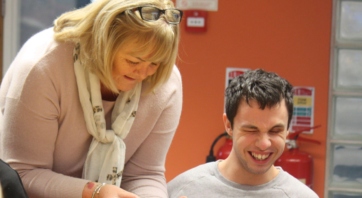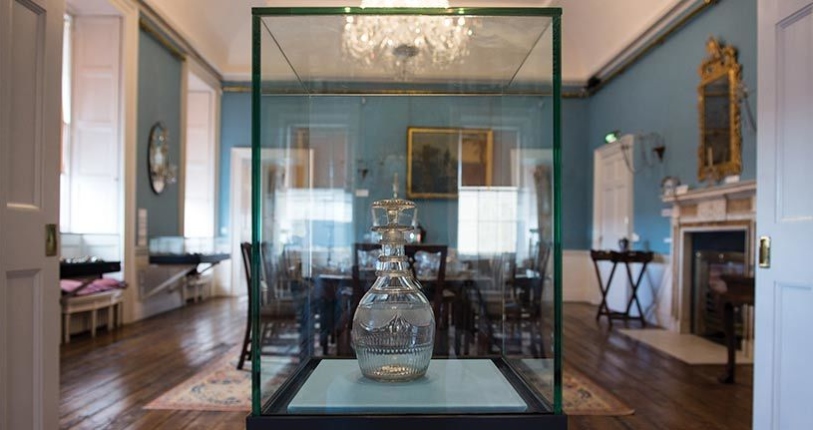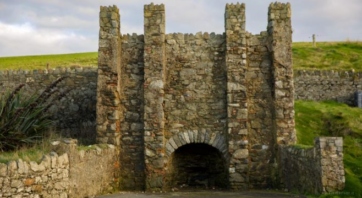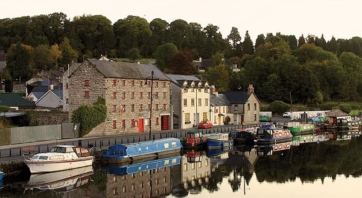
Ag Teacht ar Do Chéadfaí Nádúrtha
Tionscadal de chuid na Comhairle Oidhreachta, i gcomhpháirtíocht le Cairde Éanlaith Éireann, Caomhnú Ialtóg Éireann agus Comhairle Náisiúnta na hÉireann do na Daill.

2007- ar aghaidh
Cuireann MSPI caighdeáin ghairmiúla chun cinn maidir le cúram na mbailiúchán i músaeim agus gailearaithe Éireannacha. Aithníonn an clár éacht na gcaighdeán sin trí chreidiúnú.
Cuireann MSPI caighdeáin ghairmiúla chun cinn maidir le cúram na mbailiúchán i músaeim agus gailearaithe Éireannacha. Aithníonn an clár éacht na gcaighdeán sin trí chreidiúnú.
Bhunaigh an Chomhairle Oidhreachta an Clár um Chaighdeáin Músaem in Éirinn (MSPI) chun caighdeáin ghairmiúla a thagarmharcáil agus a chur chun cinn maidir le cúram na mbailiúchán agus aitheantas a thabhairt trí chreidiúnú éachta na gcaighdeán sin laistigh d'earnáil iarsmalainne na hÉireann.
Cén fáth Creidiúnú?
Is féidir muinín a bheith ag músaeim chreidiúnaithe go bhfuil a fhios acu conas aire a thabhairt dá mbailiúcháin agus go dtuigeann siad riachtanais a gcuairteoirí.
'Gealltanas poiblí ag gach músaem go dtabharfaidh gach músaem aire dá bhailiúchán féin é glacadh páirt i gClár '. Léiríonn creidiúnú a bhaint amach in MSPI go bhfuil músaem ag comhlíonadh a ghealltanais.'
Tá rannpháirtíocht sa chlár oscailte do:
(i) gach músaem agus gailearaí bunaithe agus incháilithe ar oileán na hÉireann agus
(ii) caomhnóirí na mbailiúchán incháilithe atá ag breithniú nó ag lorg cás níos buaine agus níos sláine dá mbailiúchán.
Is féidir caighdeáin a bhaint amach agus is féidir iad a chur i bhfeidhm ar mhúsaeim de gach méid agus leibhéal maoinithe.
Cuireann MSPI sraith ceardlann ar fáil chun tacú le baint amach na gcaighdeán seo a soláthraíonn ábhair a chuimsíonn:
Ina theannta sin comhlánaítear an clár le cúrsa iarchéime spriocdhírithe a fhaigheann tacaíocht ón gComhairle Oidhreachta agus seachadta ag Ollscoil Uladh.
Tabhair faoi dheara le do thoil, go dtagann uimhriú na dtreoirlínte thíos do na codanna ábhartha den fhoirm iarratais ar chreidiúnú.
Is iad seo a leanas a bhfuil sa doiciméad um Chaighdeáin:
Ráiteas Misin
[1.1] [EATROMHACH]
Polasaí Bailiúcháin
[1.5] [INTERIM]
Polasaí Diúscartha
[1.6] [INTERIM]
Polasaí Iasachta
[1.7] [IOMLÁN]
Úinéireacht Foirgnimh agus/nó Comhaontuithe Léasa
[2.1] [INTERIM]
Comhaontú Scríofa Foirmiúil má tá Cnuasach faoi úinéireacht agus faoi bhainistiú dhá Eagraíocht
[2.2][INTERIM]
Plean Bainistíochta Straitéisí agus Plean Gníomhaíochta Bliantúil
[2.3] [INTERIM]
Plean/Nósanna Imeachta agus Meastacháin Airgeadais
[2.6] [INTERIM]
Cuntais Iniúchta/Ráiteas Deimhnithe Cuntas
[2.7] [INTERIM]
Gnáthamh agus Sceideal Cothabhála Foirgnimh
[ 3.2] [INTERIM]
Bearta Rialaithe Lotnaidí
[3.3] [INTERIM]
Oiliúint i gCúram na mBailiúchán
[3.6, 3.7, 3.8, 3.9] [INTERIM]
Fianaise ar Fhaireachán agus ar Rialú Timpeallachta an Mhúsaeim
[3.10] [INTERIM]
Stóráil
[3.11, 3.12] [INTERIM]
Taispeántas
[3.14] [INTERIM]
Gnáthamh Cothabhála le haghaidh Taispeántais
[3.15] [INTERIM]
Staid an Bhailiúcháin
[3.18] [INTERIM]
Nósanna Imeachta Freagartha Tubaiste
[3.19] [INTERIM]
Plean Tubaiste
[3.20] [FULL]
Straitéis um Chúram na mBailiúchán
[3.21] [FULL]
Taifead Iontrála
[4.1] [INTERIM]
Taifead Aontachais, Cóip Shlán agus Réada Marcáil
[4.2, 4.3, 4.4] [INTERIM]
Córas Taifid Suímh Réada
[4.5] [INTERIM]
Córas Taifid Gluaiseacht Réada
[4.6] [INTERIM]
Córas Taifid Scoir
[4.7] [INTERIM]
Plean le haghaidh Riaráiste Doiciméadúchán
[4.9] [FULL]
Comhaontuithe Iasachta agus Taifid
[4.10, 4.11 & 4.12] [FULL]
Catalóg
[4.13] [FULL]
Tagraíonn an taispeántas do 'Taispeántais Fadtéarmacha ó Bhailiúchán an Mhúsaeim agus do Thaispeántais Shealadacha' araon.
Cur Chuige Comhsheasmhach maidir le Lipéadú
[5.1] [INTERIM]
Buiséad le haghaidh Taispeántais
[5.2] [INTERIM]
Suirbhé Cuairteoirí agus Meastóireacht ar Thaispeántais
[5.3] [FULL]
Polasaí Taispeántais
[5.4] [FULL]
Achoimre ar Ghníomhaíochtaí Oideachais/Cláir
[6.1] [INTERIM]
Polasaí Oideachais & Plean Gníomhaíochta Bliantúil
[6.6] [FULL]
Táille iontrála Cúisithe
[7.2] [INTERIM]
Comharthaíocht Sheachtrach
[7.3] [INTERIM]
Áiseanna do Chuairteoirí
[7.4] [INTERIM]
Uimhreacha Cuairteoirí agus Suirbhé
[7.7 & 7.8] [INTERIM]
Ó Eanáir 2020, tá 61 músaem (67 láithreáin) sa Chlár um Chaighdeáin Músaem. Áirítear leo sin tá institiúidí chultúir náisiúnta, údaráis áitiúil, phríobháideacha, ollscoile, comharchumainn agus músaeim bheaga faoi stiúir oibrithe deonacha. Go dtí seo tá 38 Teastas Eatramhach Creidiúnaithe, 37 Teastas Iomlán Chreidiúnaithe agus 32 Deimhniú Iomlán Chreidiúnaithe eisithe ag an gComhairle Oidhreachta.
Allihies Copper Mine Museum, Beara Peninsula, Co. Cork
Castletown House, Celbridge, Co. Kildare
Cavan County Museum, Ballyjamesduff, Co. Cavan
Chester Beatty Library, Dublin 2
Clare Museum, Ennis, Co. Clare
Computer and Communications Museum of Ireland, Galway
County Museum, Dundalk, Co. Louth
Donaghmore Famine Workhouse and Agricultural Museum, Portlaoise, Co. Laois
Donegal County Museum, Letterkenny, Co. Donegal
Drogheda Museum Millmount, Drogheda, Co. Louth
Dublin Castle State Apartments, OPW, Dublin 2
Dublin City Gallery- The Hugh Lane, Dublin 1
Edward Worth Library, Dr Steevens’ Hospital, Dublin 8
Farmleigh House, OPW, Dublin 15
Fota House, Irish Heritage Trust, Co Cork
Foynes Flying Boat and Maritime Museum, Foynes, Co. Limerick
Glebe House & Gallery, OPW, Churchill, Co. Donegal
Glenveagh Castle Museum, Glenveagh National Park, Co. Donegal
Glucksman, University College Cork, Cork
Highlanes Gallery, Drogheda, Co Louth
Irish Agricultural Museum, Irish Heritage Trust, Co. Wexford
IFI Irish Film Archive, Dublin 1
Irish Museum of Modern Art (IMMA)
Kerry County Museum, Tralee, Co. Kerry
Kilkenny Castle, OPW, Kilkenny
Kilmainham Gaol, OPW, Dublin 8
Limerick City Gallery of Art, Limerick
The Little Museum of Dublin, Dublin 2
Michael Davitt Museum, Straide, Co. Mayo
Monaghan County Museum, Monaghan
Muckross House, Killarney, Co. Kerry
Muckross Traditional Farms, Killarney, Co. Kerry
Muckross Research Library, Killarney, Co. Kerry
Músaem Chorca Dhuibhne, Baile an Fheirtéaraigh, Co. Chiarrai
National Gallery of Ireland, Co. Dublin
National Maritime Museum of Ireland, Dun Laoghaire, Co. Dublin
National Museum of Ireland: Archaeology, Kildare St., Dublin 2
National Museum of Ireland: Decorative Arts & History, Collins Barracks, Dublin 7
National Museum of Ireland: Country Life, Turlough Park, Co. Mayo
National Museum of Ireland: Natural History, Dublin 2
National Print Museum, Dublin 4
National Transport Museum, Howth, Co. Dublin
The Old Library, Trinity College, Dublin 2
Rathfarnham Castle, OPW, Dublin 14
Rothe House Museum & Gardens, Kilkenny
Royal College of Physicians of Ireland, Dublin 2
Russborough House, Blessington, Co. Wicklow
Seanchaí – Kerry Writers' Museum, Co. Kerry
Shackleton Museum, Athy, Co. Kildare
Thomas MacDonagh Museum, Cloughjordan, Co. Tipperary
Tipperary County Museum, Clonmel, Co. Tipperary
Waterford Museum of Treasures: Bishop’s Palace, Waterford
Más caomhnóir bailiúcháin tú atá ag iarraidh cúram agus bainistíocht a fheabhsú nó más mian leat d’incháilitheacht don chlár a mheas, íoslódáil agus léigh na Caighdeáin & Treoirlínte MSPI le do thoil, déan teagmháil lenár gComhordaitheoir MSPI Lesley-Ann Hayden lahayden@heritagecouncil.ie
Cé go bhfuil sé deartha chun tacú le hiarratasóirí MSPI tríd an bpróiseas iarratais ar chreidiúnú, is acmhainn thar a bheith úsáideach é an cháipéis um Chaighdeáin & Treoirlínte d’aon duine nó eagraíocht atá ag iarraidh cúram níos mó a ghlacadh dá mbailiúchán nó dá gcartlann beag beann ar a mhian nó a n-incháilitheacht a bheith rannpháirteach ar an gclár. Áirítear leis an bhfoilseachán seo freisin deich mBileog Eolais úsáideacha:
Factsheet 1 Developing A Strategic Management Plan
Factsheet 2 Finance
Factsheet 3 Condition Assessment
Factsheet 4 Drawing Up A Disaster Plan
Factsheet 5 Writing A Care Of Collections Strategy
Factsheet 6 Care Of Collections Situation Review
Factsheet 7 Exhibition Standard
Factsheet 8 Evaluation Of Exhibitions
Factsheet 9 Education Policy
Factsheet 10 Visitor Statistics Survey Form
MÚSAEIM, CARTLANNA & OIDHREACHT CHULTÚRTHA / Arna fhoilsiú 1999
Léirmhíníonn an leabhar seo na prionsabail agus na cleachtais aitheanta seo i gcomhthéacs cúraim do bhailiúcháin Mínítear cuid de na príomh-phróisis mheathlaithe agus moltar bearta chun tuilleadh damáiste a laghdú. Déantar tagairt do chodanna den fhoilseachán seo i dtreoirlínte MSPI Cúram Bailiúchán.
Foilsithe ag: An Chomhaire Oidhreachta
Údar: Susan Corr
Tá clár oiliúna i ngach gné d’obair an mhúsaeim mar chuid lárnach den Chlár um Chaighdeáin Músaem. Is trí straitéis mhachnamhach oiliúna agus forbartha gairmiúla leanúnaí (CPD) amháin a chomhlíonfaidh músaeim na hÉireann a n-acmhainneacht a bheith i gcroílár shaol sóisialta agus cultúrtha na bpobal atá ag éirí níos éagsúla.
Le linn na tréimhse creidiúnaithe spreagtar na rannpháirtithe go léir chun freastal ar cheardlanna ar ábhair chomh héagsúil le Pleanáil Straitéiseach, Polasaí Bailiúcháin a Scríobh, agus Pleanáil Tubaiste i measc nithe eile. Tá na ceardlanna seo oscailte d’fhoireann uile an mhúsaeim cibé acu an bhfuil baint acu leis an gclár nó nach bhfuil (cé ar chúiseanna lóistíochtúla más gá srian a chur ar an líon is féidir tosaíocht a thabhairt don chuid den chlár).
Próiseas céimnithe is ea creidiúnú agus nuair a chomhlíonann músaem an Chreidiúnú Iomlán beifear ag súil go mbeidh oiliúint faighte ag iarratasóirí i ngach ábhar ábhartha a bhaineann le cúram bailiúcháin, nuair is gá.
Go suntasach tá an Clár um Chaighdeáin Músaem comhlánaithe ag clár oiliúna iarchéime atá á thairiscint faoi láthair ag Ollscoil Uladh (ar líne) agus a forbraíodh i gcomhpháirtíocht leis an gComhairle Oidhreachta. Freagraíonn an clár seo don éileamh ar dheiseanna méadaithe oiliúna agus taighde a bhaineann le cleachtas agus bainistíocht músaem. Déanann sé riachtanais mhúsaem na hÉireann a cheangal leis an gcleachtas is fearr sa Ríocht Aontaithe agus go hidirnáisiúnta. Le tuilleadh eolais a fháil faoi Ollscoil Uladh féach ar: http://www.ulster.ac.uk/
Tuilleadh eolais ar an Dioplóma Iarchéime i gCleachtas agus Bainistíocht Iarsmalainne
Breathnóidh an Chomhairle Oidhreachta ar sparánachtaí a sholáthar do chúrsaí ar líne de chuid UU chun tacú le caighdeáin a ardú ar fud earnáil Mhúsaem na hÉireann. Ag teacht lena cleachtas caighdeánach, ní mhaoineoidh an Chomhairle Oidhreachta níos mó ná 75% d’aon mhodúl amháin nó trí cinn as ceithre mhodúl.
Tabhair faoi deara: Níl sparánachtaí ar fáil ach don fhoireann nó i gcásanna áirithe d’oibrithe deonacha rannpháirtithe MSPI. Ní mór d’iarratasóirí foirm iarratais sparánachta a chomhlánú agus í a chur faoi bhráid na Comhairle Oidhreachta roimh thosú gach modúl chun incháilitheacht agus infhaighteacht sparánachta a (ath) dheimhniú i dtreo costas an mhodúil. Caithfidh an fhoirm a bheith sínithe ag Stiúrthóir/Bainisteoir an iarratasóra.
Le haghaidh tuilleadh eolais déan teagmháil le Lesley-Ann Hayden, Comhordaitheoir MSPI lahayden@heritagecouncil.ie
Léiríonn an chairt seo leibhéal creidiúnaithe reatha Rannpháirtithe MSPI deimhnithe agus na blianta ina bhfuair siad deimhnithe creidiúnaithe.
Tógann an próiseas creidiúnaithe timpeall 5 bliana. Go hiondúil cuireann rannpháirtithe iarratais isteach ar Chreidiúnú Eatramhach (25 caighdeán) ag druidim le deireadh Bhliain 3 den Chlár agus iarratais ar Chreidiúnú Iomlán (9 gCaighdeán Iomlán agus 25 Chaighdeán Eatramhach) ag druidim le deireadh Bhliain 5. Tá roinnt Rannpháirtithe réidh le hiarratas a chur isteach ar gach caighdeán tar éis trí bliana agus is féidir cead a thabhairt dóibh dul thar chéim an Iarratais Eatramhaigh.
Trí bliana tar éis Deimhniú Creidiúnaithe Iomlán a fháil ní mór do rannpháirtithe iarratas a chur isteach chun Cothabháil Creidiúnaithe Iomlán a dheimhniú.
Éilítear ar rannpháirtithe ansin iarratas nua ar Chothabháil Chreidiúnaithe Iomlán a chur isteach laistigh de chúig bliana ó theastas a fháil chun Cothabháil Creidiúnaithe a dheimhniú.
Nuashonrú is déanaí Meitheamh 2021

Tionscadal de chuid na Comhairle Oidhreachta, i gcomhpháirtíocht le Cairde Éanlaith Éireann, Caomhnú Ialtóg Éireann agus Comhairle Náisiúnta na hÉireann do na Daill.

Tionscnamh ón Comhairle Oidhreachta agus Iarsmalann Náisiúnta na hÉireann a thugann cuireadh duit do chuid fionnachtana agus léargais a roinnt ar oidhreacht folaithe do cheantar.

Tacú le tionscadail chomhoibríocha a dhéanann measúnú ar fheidhmeanna, ar phointí díola uathúla, ar cháilíocht spásanna poiblí agus ar shainchomharthaí tíre cathartha i mbailte stairiúla d’fhonn pleananna físiúla a cheapadh agus a fhorbairt dá bhforbairt amach anseo.